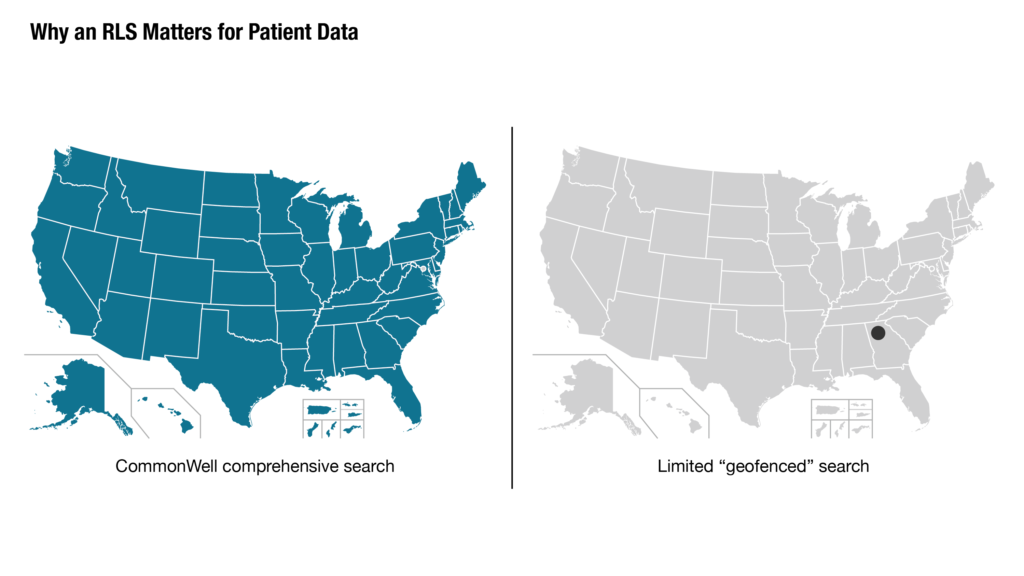As we and our fellow partners in health IT ramp up for enhanced nationwide interoperability via the Trusted Exchange Framework and Common Agreement (TEFCA), CommonWell has a highly efficient service in operation at scale today that makes it uniquely positioned to transition to Qualified Health Information Network (QHIN) status and offer entities looking for a QHIN partner a powerful solution now. The Record Locator Service or RLS.

Why is the CommonWell RLS unique and important to QHIN success?
The RLS allows a provider organization linked to CommonWell to search the entire nationwide network in real time to gather comprehensive patient data—not just data from a limited geofenced location as other networks and frameworks offer. It does this by matching patient data and allowing a single request from a provider to quickly search the entire network and provide comprehensive results. Almost like Google for health data.
In contrast, how does a health data exchange network or framework find data if it doesn’t have this magical RLS? Simply, it guesses. It uses information like where you live or where you have had care before as an indicator of where you are likely to have your health data. This is often called geofencing or geosearching—because searches usually take place within a specific geographic area, for example 50 square miles, and searches only organizations within that radius. This search is done by querying each potential care point within that area. That process of many requests combined with the limited search area is inefficient and results in incomplete treatment data. The provider asking for patient records will not know what data they may be missing and, as requests pile up within the network or framework, response time slows.
With the CommonWell RLS, providers can be sure when they search the network for a patient’s data they are getting a speedy and a comprehensive result. This is technology CommonWell is already using nationwide today—among a plethora of service adopters and across numerous care settings.
As we embark on rolling out TEFCA and CommonWell applies to be a QHIN, it is important we remember what we have been working to build for much of the decade CommonWell has been in existence: one single on-ramp for me and my provider of care to have access to a comprehensive view of my clinical record. We need to recognize that geofencing methods of data aggregation are guaranteed to miss data and all agree it is time to cooperate and do it right. We need a coordinated national approach.
As the nation’s only vendor-neutral trade alliance focused on interoperability for the common good, CommonWell and its more than 80 members share the belief that health data should be available to individuals and caregivers regardless of where care occurs. We are excited to offer our RLS at the edge of our community to every other QHIN and their stakeholders. We will continue to advocate for national RLS coordination without artificial boundaries such as geography and vendor. The following link will take you to recent comments we sent to the ONC advocating for coordinated record location under TEFCA.
Our efforts to build, scale and offer the CommonWell RLS to our growing organization illustrates our commitment to that mission today. We are ready for TEFCA done right. Are you ready to join us?
To learn more about CommonWell and its journey to be a QHIN, visit commonwellalliance.org/TEFCA.
